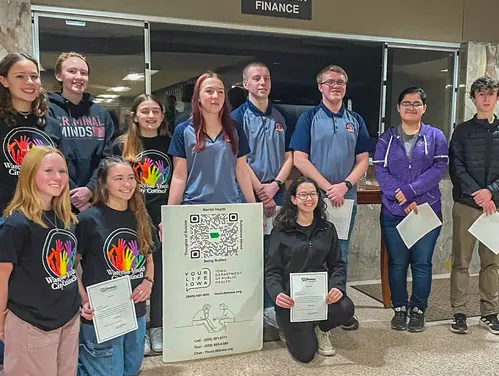When Waterloo high school students put their minds together, great things happen. So it goes with the state’s new requirement for student identification cards, which now must have information about the statewide crisis line on them.
The concept was the brainchild of the Waterloo Youth City Council, an ancillary group to the Waterloo City Council, which is comprised of high school students. The youth council’s mission is to focus on student-related issues.
As the state was coming out of the pandemic, the youth council members thought they should tackle mental health.
“After the pandemic, they said that mental health was important to them personally, to their schools and to their friends,” said youth council co-director Carol Luce. “They wanted to be proactive, so they started networking with different agencies that address mental health, and they networked with our state legislative representative.”
The group concluded that they needed to get the word out to fellow students about mental health help. What better way than to put it on the student IDs?
In 2022, the students took a trip to Des Moines to meet with legislators to push for requiring the crisis line to be on every student ID. It failed to pass. Undaunted, they turned to their school district, as well as neighboring school districts. The districts liked it. Last fall, the crisis line debuted on the student IDs of the Waterloo, Cedar Falls, Cedar Valley Catholic and Hudson school districts. In addition to the hotline number, the students’ design included a QR code which, when scanned by a smart phone, will automatically take you to the site. But why the QR code?
“Students don’t dial anymore,” Luce said. “They use the QR codes.”
The Legislature was still on the minds of the youth council. But they wanted to make their proposal more appealing. So they approached Lifetouch, the company that provides student IDs to the schools throughout the state. Lifetouch loved the idea, and agreed to put the potential life-saving information on the cards – for free.
Armed with that information, the youth council again descended upon the Legislature last spring. The result is history – Your Life became a reality. It is a 24/7 statewide resource that can provide information and support for individuals looking for assistance with mental health, substance use, gambling, suicide and other concerns. Services are open to all ages and income levels, and trained professionals can be contacted through phone, text, chat and email.
Today, schools must have Your Life information on identification cards for students in grades 7 through 12. School districts also may opt to provide the information for identification cards in grades 5-6.
“This is not just great for the students but also for our parents who now know where they can connect immediately for help for their child or themselves,” Luce said
The students learned a lot along the way.
“Initially, they were very nervous in speaking with the legislators,” Luce said. “I said ‘speak from your heart. It is very powerful.’”
The youth council isn’t one to rest on its laurels. Indeed, the council is still focusing on mental health, having worked with a local TV station to create three public service announcements. They are also taking QPR training – question, persuade and referral – which focuses on helping others who are having mental health problems. And they are working on getting other students and community members on board with the training, too.
“They are tireless,” Luce said. “They have learned they can accomplish great things, and it motivates them to do even more.”
